Organic brown sugar is gaining popularity as a healthier and more ethical alternative to conventional white sugar. Derived from organically grown sugar cane, it is produced using farming practices that adhere to USDA organic standards. These practices limit the use of chemical pesticides and synthetic fertilizers, making it a better choice for those concerned about toxic chemicals in their food.
Additionally, organic brown sugar is more sustainable, as it helps mitigate the environmental impacts of sugar cane production. Several brands offer sustainably grown and ethically sourced options, making it easier than ever to choose organic brown sugar.
Key Takeaways
- Organic brown sugar is produced from organically grown sugar cane and follows strict organic farming practices, limiting the use of synthetic pesticides and chemicals.
- Vegan consumers should opt for unrefined or raw brown sugar, as refined brown sugar may be processed using animal-derived bone char. Vegan alternatives to brown sugar include coconut sugar.
- While brown sugar contains slightly more minerals than white sugar, it does not offer significant health benefits and should be consumed in moderation as added sugars can have negative health impacts.
- Choosing organic brown sugar supports sustainable farming practices, reduces environmental impacts such as water pollution and deforestation, and promotes fair treatment and payment for farmers.
The Benefits of Organic Brown Sugar
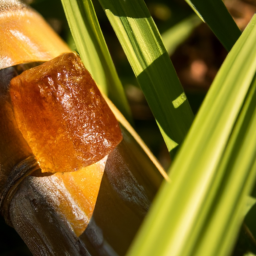
Organic brown sugar offers a healthier alternative to refined brown sugar and can be used in a variety of recipes. Made from organically grown sugar cane, organic brown sugar is produced using organic farming practices. These practices adhere to the U.S. Department of Agriculture’s organic standards, which include protecting soil health and prohibiting the use of sewage sludge and genetically modified seeds.
When sugar cane is grown organically, chemical pesticides and synthetic fertilizers are limited. Additionally, some brands of organic brown sugar have fair trade certification, ensuring fair treatment and payment for farmers. Choosing organic brown sugar not only reduces exposure to toxic chemicals but also supports sustainable and ethical farming practices.
Whether you’re baking cookies or sweetening your morning coffee, organic brown sugar is a healthier and more environmentally friendly choice.
Health Considerations When Choosing Organic Brown Sugar
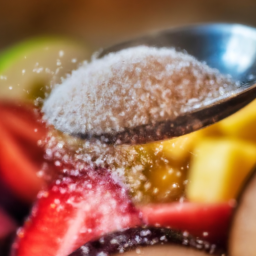
Unrefined and raw brown sugars provide minimal nutritional benefits compared to white sugar. However, they do offer some vegan options and unique flavor profiles. Here are some key points to consider:
Vegan options:
Unrefined and raw brown sugars are vegan-friendly alternatives to white sugar.
Refined brown sugar may not be vegan due to the use of bone char in the refining process.
Vegan refined sugar uses ion exchange resin instead of bone char.
Brown sugar made from sugar beets is vegan as it does not require the bone-char process.
Coconut sugar can also be used as a vegan alternative to brown sugar.
Flavor profiles:
Brown sugar has a distinct caramel-like flavor due to the presence of molasses.
Dark brown sugar has a stronger and more robust flavor compared to light brown sugar.
The flavor of brown sugar can enhance baked goods, sauces, and marinades.
While brown sugar may not offer significant nutritional benefits, it can provide vegan options and add unique flavor profiles to various recipes.
Environmental Impacts of Brown Sugar Production

Brown sugar production, particularly from sugar cane, has been associated with negative environmental impacts such as water pollution and deforestation.
The cultivation of sugar cane requires large amounts of water, leading to water scarcity in some regions. Additionally, the use of pesticides and fertilizers in sugar cane production pollutes water sources, harming aquatic ecosystems. Deforestation occurs as land is cleared to make way for sugar cane plantations, resulting in the loss of biodiversity and habitat destruction.
To address these issues, efforts are being made to reduce water usage in brown sugar production through the implementation of water-efficient irrigation systems and techniques. Furthermore, implementing fair trade practices in brown sugar production ensures that farmers receive fair wages and working conditions, promoting social and economic sustainability in the industry.
Why Choose Organic Brown Sugar: Healthier Option
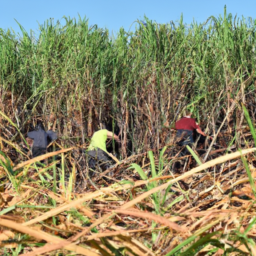
Consumers who prioritize their wellbeing often opt for organic brown sugar due to its minimal use of toxic chemicals during production.
- Organic brown sugar is produced from organically grown sugar cane, following strict organic farming practices.
- These practices limit the use of chemical pesticides and synthetic fertilizers, reducing the exposure to harmful substances.
Vegan alternatives, such as coconut sugar, can also be used as substitutes for brown sugar.
- In terms of flavor profiles, organic brown sugar offers a rich and robust taste, with a hint of natural molasses.
- It adds depth and complexity to baked goods, desserts, and beverages, enhancing their overall taste.
Compared to refined brown sugar, organic brown sugar is a healthier option.
- It retains some minerals from the sugar cane, although the amounts are minimal.
- However, it is important to note that brown sugar, whether organic or refined, should be consumed in moderation due to its high sugar content.
Ethical Considerations of Organic Brown Sugar

The production of organic brown sugar aligns with ethical practices that prioritize the well-being of farmers and the environment.
Organic brown sugar sourcing involves using organically grown sugar cane, which is cultivated without the use of synthetic pesticides or chemical fertilizers. This not only protects the farmers from exposure to harmful chemicals but also ensures that the soil and surrounding ecosystems remain healthy.
Additionally, fair trade certification plays a crucial role in promoting ethical practices in the production of organic brown sugar. Fair trade certification ensures that farmers receive fair wages and are provided with safe working conditions. It also promotes sustainable farming practices and supports community development projects.
Sustainable Practices in Organic Brown Sugar Production
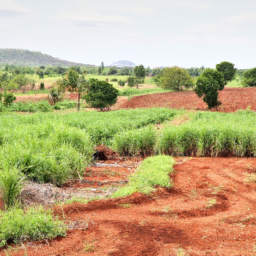
Sustainable practices in the production of organic brown sugar prioritize the well-being of farmers and the environment. To achieve this, farmers employ sustainable farming techniques that aim to minimize negative impacts on wildlife conservation and promote ecological balance.
These techniques include:
Wildlife conservation:
Creating wildlife corridors to allow animals to move freely between habitats and prevent fragmentation.
Protecting natural habitats within sugar cane plantations to preserve biodiversity and provide refuge for wildlife.
Sustainable farming techniques:
Utilizing natural pest control methods, such as introducing beneficial insects or using trap crops to reduce pesticide use.
Implementing soil conservation practices, such as cover cropping and crop rotation, to maintain soil health and prevent erosion.
Comparing Different Brands of Organic Brown Sugar
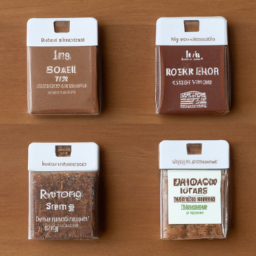
Wholesome Fair Trade Organic Brown Sugar grows its products sustainably and offers both light and dark varieties.
When comparing organic brown sugar to conventional brown sugar, the main difference lies in the farming practices and production methods. Organic brown sugar is made from organically grown sugar cane, which means no synthetic pesticides or fertilizers are used. In contrast, conventional brown sugar may contain residues of these chemicals.
Choosing organic brown sugar can be a healthier and more ethical option, as it supports sustainable farming practices and fair treatment for farmers.
As for the best recipes using organic brown sugar, it can be used in a variety of dishes such as cookies, cakes, and sauces. Its rich flavor adds depth and sweetness to these recipes, making them even more delicious.
Nutritional Comparison: Brown Sugar Vs. White Sugar
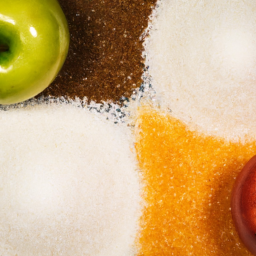
When comparing brown sugar to white sugar, it provides slightly more minerals, but the amounts are too small to be significant. Brown sugar contains trace amounts of minerals like calcium, potassium, magnesium, and iron. However, these minerals are present in such small quantities that they do not contribute significantly to the overall nutritional value of brown sugar.
Nutritional Comparison:
- Brown Sugar:
- Contains trace amounts of minerals like calcium, potassium, magnesium, and iron.
- Provides empty calories without any significant health benefits.
- White Sugar:
- Does not contain any minerals.
- Provides empty calories without any significant health benefits.
It is important to note that both brown sugar and white sugar have a high glycemic index, meaning they can cause a rapid spike in blood sugar levels. Therefore, individuals with diabetes or those looking to manage their blood sugar levels should consume both types of sugar in moderation.
Tips for Incorporating Organic Brown Sugar Into Recipes

Incorporating organic brown sugar into recipes adds a rich and caramel-like flavor that enhances the overall taste of baked goods and sweet treats. To make the most of this natural sweetener, it is important to properly store and utilize it in creative ways.
When storing organic brown sugar, it is essential to keep it in an airtight container to prevent it from hardening. Adding a slice of bread or a damp paper towel to the container can help maintain its moisture.
When it comes to creative uses, organic brown sugar can be used in various recipes, including cookies, cakes, pies, and even savory dishes like glazes for roasted meats. It can also be sprinkled on top of oatmeal or yogurt for added sweetness.
With these tips and ideas, incorporating organic brown sugar into your recipes will elevate their taste and make them even more delicious.
Frequently Asked Questions
Is Organic Brown Sugar Healthier Than Regular Brown Sugar?
Organic brown sugar is often considered healthier than regular brown sugar due to its production methods. While it offers similar nutritional value to white sugar, it contains slightly more minerals. However, the amounts are too small to provide significant health benefits.
The main advantage of organic brown sugar lies in its lack of synthetic pesticides and chemicals, making it a better choice for those concerned about their exposure to toxins. It should still be consumed in moderation, as added sugars can have negative health impacts.
How Does Organic Brown Sugar Impact the Environment?
Organic brown sugar has a positive impact on the environment due to its sustainable production methods. It is produced from organically grown sugar cane, which reduces the use of synthetic pesticides and chemicals. This helps to protect soil health and prevent water pollution.
Organic farming practices also promote biodiversity and habitat preservation through wildlife corridors and natural pest control. By choosing organic brown sugar, consumers support a more environmentally sustainable and ethical option compared to conventionally produced brown sugar.
What Are the Ethical Considerations of Choosing Organic Brown Sugar?
Ethical considerations in choosing organic brown sugar revolve around ethical sourcing and fair trade practices.
Organic brown sugar is produced using organic farming methods, which prioritize soil health and limit the use of synthetic pesticides and fertilizers. By choosing organic brown sugar, consumers support sustainable and environmentally-friendly practices.
Additionally, some brands, such as Wholesome Fair Trade Organic Brown Sugar, offer fair trade certified options, ensuring that farmers receive fair treatment and payment for their products. This promotes ethical and equitable trade relationships in the sugar industry.
Are There Any Specific Sustainable Practices Used in Organic Brown Sugar Production?
Sustainable farming practices and fair trade practices are commonly used in organic brown sugar production. These practices aim to minimize environmental impacts and ensure fair treatment and payment for farmers.
Organic sugar cane farming often includes techniques like wildlife corridors and natural pest control to promote biodiversity and reduce the need for synthetic pesticides.
Additionally, some brands, like Wholesome Fair Trade Organic Brown Sugar and Thrive Markets Dark & Light Organic Brown Sugar, prioritize ethical sourcing and sustainability in their production processes.
Are There Any Alternatives to Organic Brown Sugar That Offer Similar Benefits?
Alternatives to organic brown sugar that offer similar benefits include coconut sugar and date sugar.
Coconut sugar is made from the sap of coconut palm trees and is considered a healthier alternative to refined sugar. It has a similar taste and can be used in a variety of recipes.
Date sugar is made from dried dates and contains natural fiber and minerals.
Both alternatives are vegan and can be used as substitutes for organic brown sugar in baking and cooking.